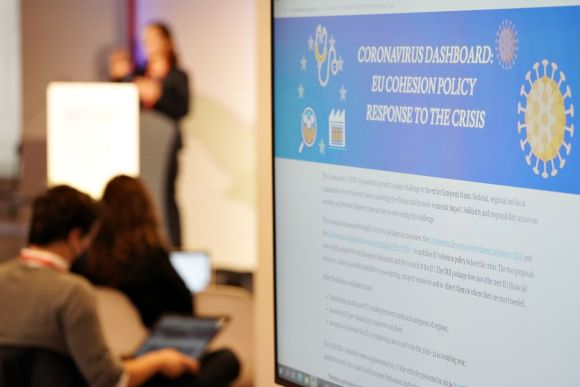
Overcrowded hospitals, a shortage of free beds, national lockdowns and millions of people suddenly unemployed: the coronavirus pandemic triggered a shock effect on Europe. The outbreak is testing European cooperation in ways that seemed unimaginable years ago. On the financial side, every single Euro available had to be used as quickly as possible to protect as many lives as possible, safeguarding the global economy and consequently people's livelihood.
"The situation has been evolving. At first sight, it was clear that the health sector was put under a lot of strain. That was clearly the first area that needed support," says Kadri Uustal, Head of Unit for Coordination of Programmes, Directorate-General for Regional and Urban Policy of the European Commission. When lockdowns were introduced in many countries, she realized what a severe impact this would have on the economic situation in Europe: the ripple effect was beginning to show. Only speed could help regions to deal with the public health emergency in the best possible way. Member States were able to adopt liquidity, budgetary and policy measures to increase the capacity of their health systems and guarantee financial relief for citizens in a particularly demanding time.
In Bulgaria, for example, the Coronavirus Response Investment Initiative (CRII) guaranteed the reallocation of more than €20 million euros of cohesion policy funding to strengthen the healthcare sector in response to the outbreak of the pandemic. This amount of money allowed the Bulgarian Ministry of Health to purchase new top class medical equipment and life-saving medication. This provided the country with 377 ventilators, over 2 million face masks and 177,000 test kits for the most difficult times. "We tried to make sure there was enough flexibility for the regions to use cohesion policy to address these issues," says Uustal.
Each country had special needs. While some required additional support for businesses in their suffering economies, others needed aid in the field of education. This was the case in Poland: €82 million euros were distributed to municipalities to buy computer equipment. Only by providing access to mobile internet and the necessary technical toolkits, children and teachers of the “Remote School Project" were able to advance with their school programs. "I like the one where they were buying laptops for kids who had to do remote learning but who didn't have a computer at home or had a parent that had to work on the computer. For me these are the most touching stories," says Uustal, who became Head of the Unit during the pandemic. Her personal life has also changed considerably as a result of the virus: after all, schools were closed.
"We were trying to make changes and help the regions, but we were all working from home with kids running around. And those who have young kids know that is not easy. So that was definitely a huge challenge". Indeed, the days were long. "These were not eight hours working days, they were very long working days". Those were hours that helped people in all regions of Europe to get through this unique crisis better. "It's important that we tell people: Europe is helping. And to show the real life examples. It's important to point out that people, like my neighbour, have received support – or that hospitals got a new wing because Europe found it important to support this region".
To ensure the necessary transparency, the European Commission has launched the Coronavirus Dashboard. It aims to show with accountability how the EU Cohesion policy is helping Member States to fight the coronavirus crisis. All information regarding programme amendments, resource flows and investments will be displayed by country. Every project has the obligation to display a plaque as a sign proving that the project has been supported with money from the European Union.
Ultimately, it is not about returning to the old normality, but about developing a new vision. "It's not about restoring the economy we had, it's about a greener Europe. It's not about rebuilding the old, it's about building it better". According to the Estonian expert, the crisis has given the EU the chance to see things in a different light. As a result, it has contributed to making it easier to imagine a more sustainable, greener and smarter future. The catalyst effect resulting from large investments can transform the world into a better place to live in. The pandemic will be over one day - and what will remain is a more environmentally friendly European Union with intensified levels of cooperation between its regions.
By Anastasia Lopez, Austria



